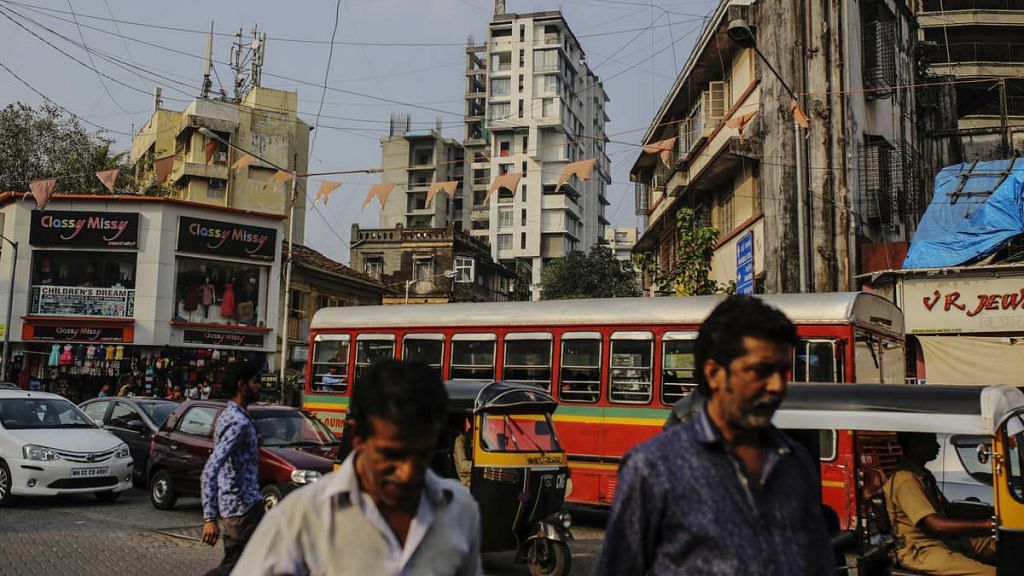On the eve of the assembly election in Maharashtra, political experts sitting in TV studios are talking about everything but Mumbai.
National media has discovered Marathwada, Vidarbha, Konkan, north Maharashtra and, of course, western Maharashtra. It’s as if Mumbai has no politics.
Media starts talking about Mumbai only when the stock market fluctuates or a Bollywood celebrity gets married or the Ambanis throw a big bash for the who’s who.
Why is it that Delhi, which has roughly the same population as Mumbai, is recognised by its politics while no one knows or cares about the politics of Mumbai?
Except for the shenanigans of a Sanjay Nirupam or a Milind Deora, Mumbai’s politics has hardly been discussed in the run-up to the elections.
Mumbai is truly multi-cultural, multi-lingual and multi-ethnic, but does not have a party, which can represent its cosmopolitan and liberal character.
Also read: After chor-police for 36 years, Mumbai’s ‘Dirty Harry’ set to begin political innings now
A story of political neglect
Mumbai is not seen as a political metropolis despite having 36 assembly constituencies. And that’s because all major political parties have neglected the city. Not even the Shiv Sena, which is known for its distinct ‘Mumbai character’, can boast of building a rock-solid base in the city. More than 50 years since its inception, the Sena of the Thackerays still cannot mobilise the non-Marathi Mumbaikars.
The Congress, which was in power for a long time, also failed to create a political base in Mumbai. The BJP of Narendra Modi and Amit Shah too has to depend on the Marathi populism of the Shiv Sena in Mumbai. Other parties, like the NCP of Sharad Pawar, are simply irrelevant in the city.
The disdain for the political parties is reflected in the low voter turnout in Mumbai, election after election.
Bombay or Mumbai may have been won through a movement, but the parties that led the agitation did not have a vision for the metropolis. The trade union movement, which shaped the politics of the city’s working class till the seventies, fizzled out too, leaving the Mumbaikar politically orphan.
This is perhaps the reason why no political leader is associated with Mumbai alone, unlike a Nitin Gadkari from Nagpur or a Mamata Banerjee from Kolkata.
The name that comes closest to mind is Bal Thackeray, and even he remained an icon for the ‘Marathi manoos’ – not the whole of Mumbai or Maharashtra. Thackeray’s father, Prabodhankar Thackeray, was one of the leaders of the Samyukta Maharashtra Samiti, which campaigned for a separate Marathi-speaking state with Bombay as the capital.
Also read: Congress is confused whether Sharad Pawar is saviour or threat in Maharashtra
Who will rule Mumbai?
This election season, Bal Thackeray’s nephew, Raj, has been campaigning against the ‘Gujarati takeover’ of Mumbai. At one of the rallies, Raj Thackeray, the chief of Maharashtra Navnirman Sena, said that even Maharashtra can be “split into pieces”. “Today it’s Kashmir, tomorrow it can be Vidarbha and Mumbai,” he said.
Raj’s cousin, Uddhav Thackeray, is part of the same alliance he is hitting out at. In fact, this alliance – between Uddhav’s Thackeray-led Shiv Sena and BJP – has kept national media and political experts guessing about its next move. Much energy has been spent on decoding their rivalry and their competitive Hindutva politics. Reams have been written on whether the BJP and the Shiv Sena would come together, and if they do, how long will the alliance last before there is a split, again.
It is common knowledge that Modi and Amit Shah neglect (and even insult) the Sena. In the past, Shah had asked the Sena to follow the “alliance dharma” even as he encouraged the BJP workers to strive for “shat-pratishat” (or 100 per cent) performance in the state.
But both parties know that they can claim the throne in Mumbai only if they come together, be it before or after the elections. They fought the 2014 assembly election separately. The BJP had thought it could win a majority on its own by riding the Modi wave. But the results were an eye-opener: although the BJP’s tally improved significantly, it still fell short of the majority mark. It finally formed the government with the Shiv Sena’s support.
Five years later, many say there is another Modi wave in the country following the government’s decision to scrap Article 370. But if that was the case, there was no need for the BJP to agree to a seat-sharing pact with the Shiv Sena, giving the ally 124 of the 288 seats in Maharashtra. Similarly, the Shiv Sena, despite its criticism of the Modi government, settled for a ‘younger brother’ position in the alliance.
Indeed, this saffron alliance is driven by pragmatism and opportunism, and has no basis in ideology or even politics.
Mumbai deserves better. The city that never sleeps needs politicians who can keep up with its pace and represent its cosmopolitan fabric.
Also read: All that Raj Thackeray wants is to be in Maharashtra’s opposition
The author is a former editor and Congress member of Rajya Sabha. Views are personal.
